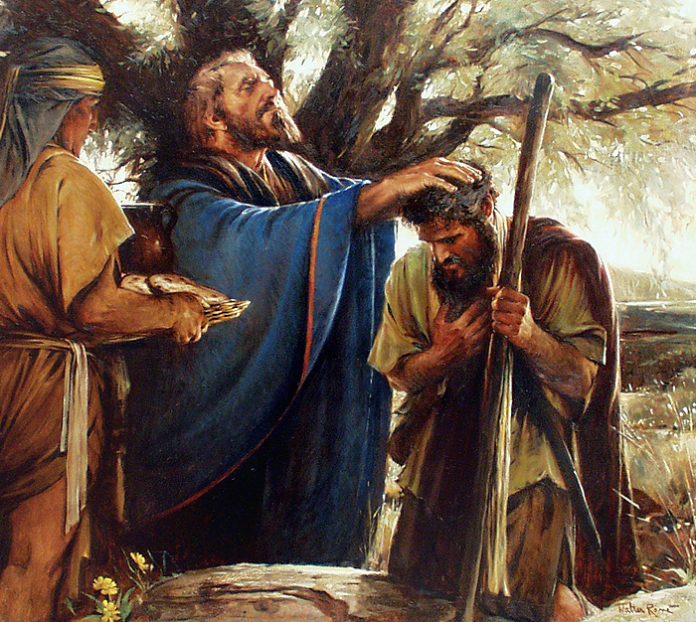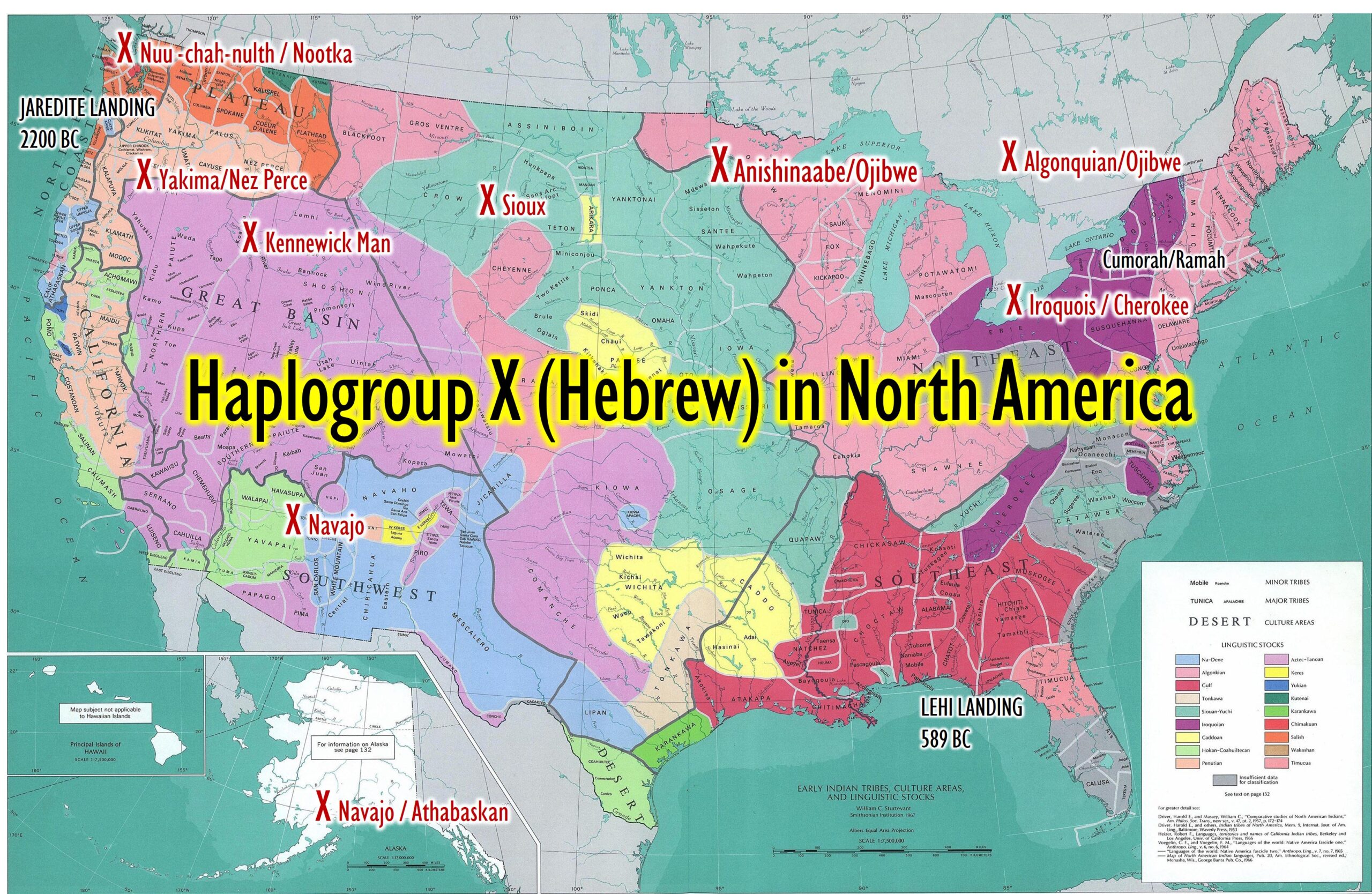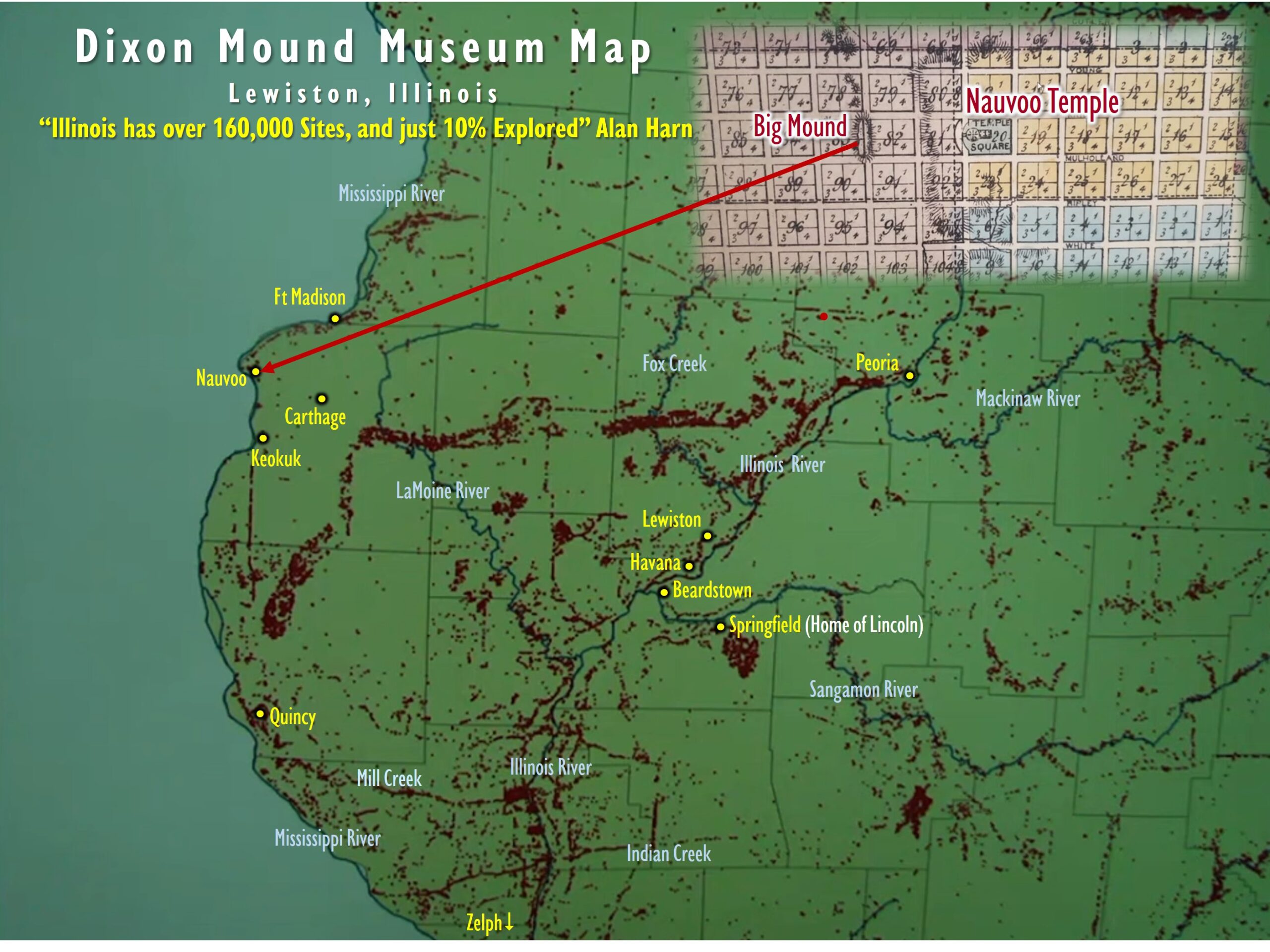What is the significance of three altars mentioned by Heber C. Kimball during Zions Camp? Or, the three unique altars at the Kirtland Temple? or the three offices of the priesthood? Aren’t there only two Priesthoods, namely Levitical and Melchizedek? “There are, in the church, two priesthoods, namely, the Melchizedek and Aaronic, including the Levitical Priesthood.” D&C 107:1 This article will explain there are actually 3 Priesthoods including the Patriarchal Priesthood.
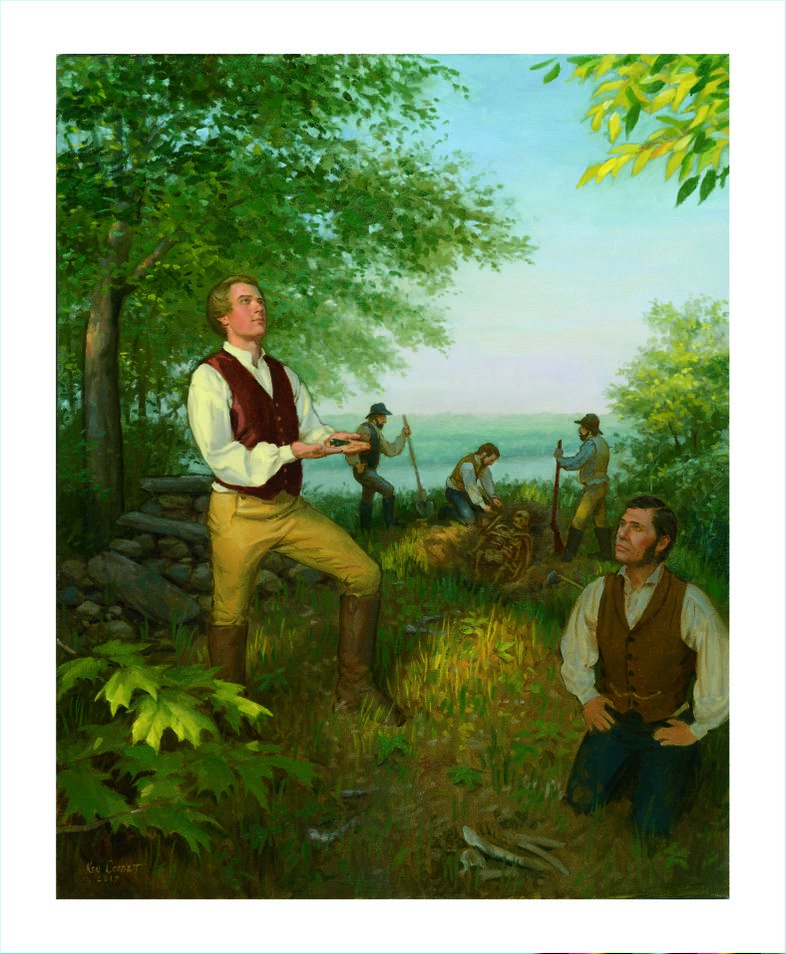
Heber C. Kimball-
Three Grades of Priesthood
Three Altars, The Ancient Order
“On Tuesday, the 3d, several of us went up with the Prophet to the top of a mound on the bank of the Illinois River, which was several hundred feet above the river, and from the summit we had a pleasant view of the surrounding country. We could overlook the tops of the trees and the meadow or prairie on each side the river as far as our eyes could extend, which was one of the most pleasant scenes I ever beheld. On the top of this mound there was the appearance of three altars,, which had been built of stone, one above the other, according to the ancient order; [See picture left. 3-Altars on Zelph’s Mound], and the ground was strewn with human bones. This caused in us very peculiar feelins, to see the bones of our fellow creatures scattered in this manner, — fellow creatures who had been slain in ages past. We felt prompted to dig down into the mound, and sending for a shovel and hoe, we proceeded to move away the earth. At about one foot in depth we discovered the skeleton of a man, almost entire; and between two of his ribs we found an Indian arrow, which had evidently been the cause of his death. We took the legf and thio-h bones and carried them to Clay County. All four appeared sound. Brother Brigham Young has yet the arrow in his possession. It was a common thing to find bones thus bleaching upon the earth in that country. “The same day we pursued our journey. While on our way we felt anxious to know who the person was who had been killed by that arrow. It was made known to Joseph that he had been an officer who fell in battle, in the last destruction among the Lamanites, and his name was Zelph. This caused us to rejoice much, to think that God was so mindful of us as to show these things to His servant. Brother Joseph had enquired of the Lord and it was made known to him in a vision. P 62 LIFE OF HEBER C. KIMBALL
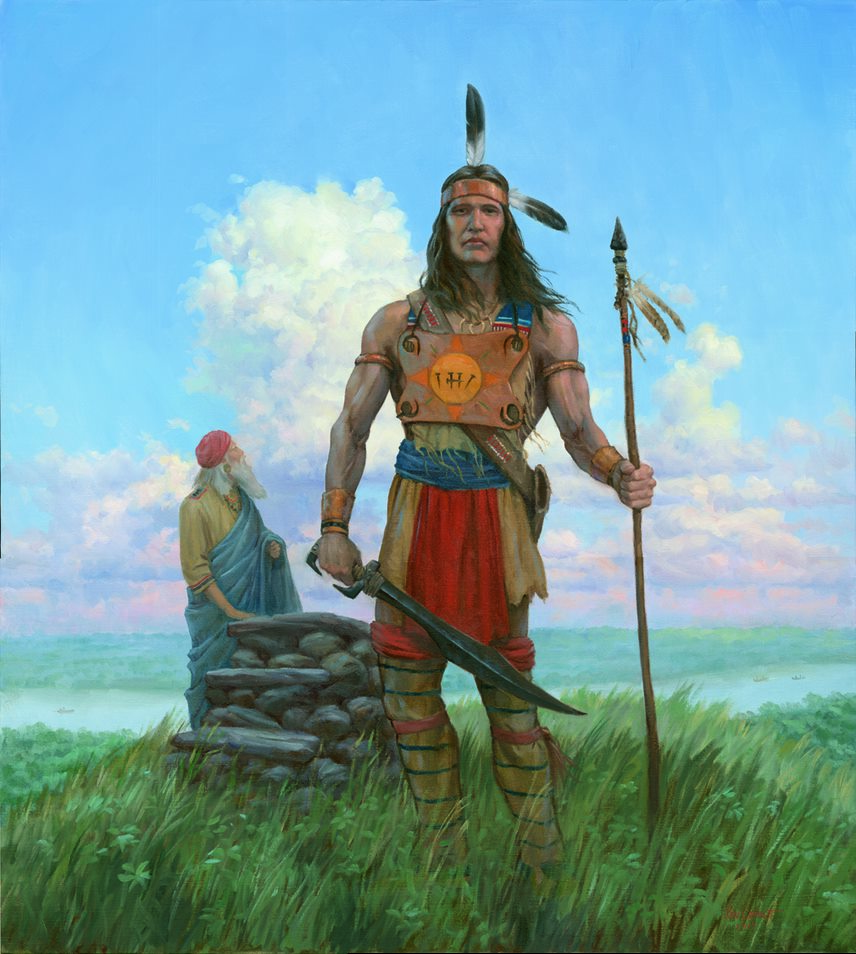
The Prophet Joseph called upon Brother Brigham, myself and others, saying, “Brethren, come, go along with me, and I will show you something,” He led us a short distance to a place where were the ruins of three altars built of stone, one above the other, and one standing a little back of the other, like unto the pulpits in the Kirtland Temple, representing the order of three grades of Priesthood; “There,” said Joseph, “is the place where Adam offered up sacrifice after he was cast out of the garden.” The altar stood at the highest point of the bluff. I went and examined the place several times while I remained there. (Life of Heber C. Kimball , pp. 209-210)
Appendix: Kirtland Temple pulpits by Kip Sperry
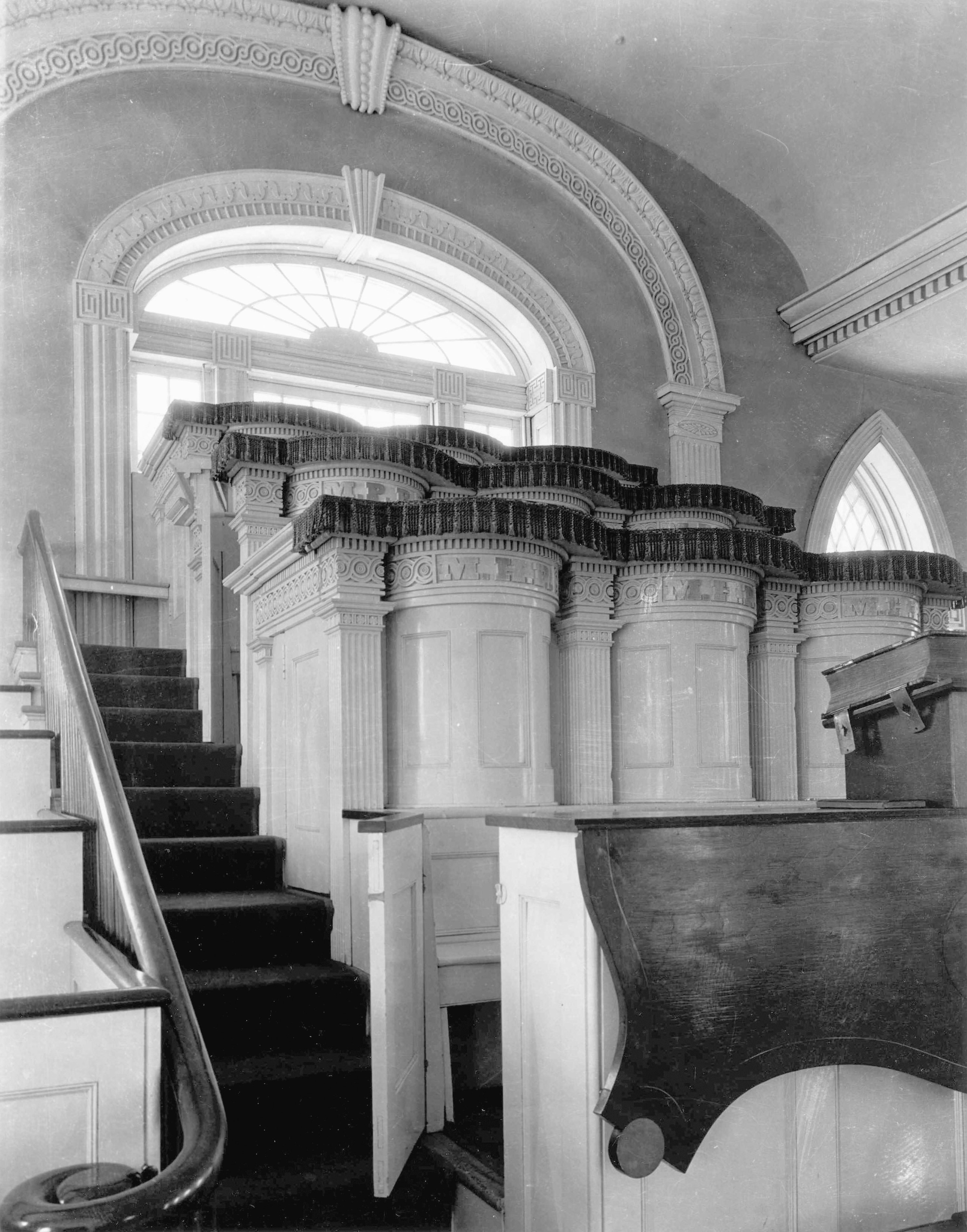
BECAUSE OF GENERAL INTEREST REGARDING THE INITIALS on the pulpits in the Kirtland Temple, they will be explained in this section. There are two sets of elevated pulpits (altars) in the Kirtland Temple, known as the house of the Lord—one set is located in the lower auditorium and another set in the upper (second floor) auditorium. Pulpits in the upper court (second floor) of the temple are not as decorative and are less elevated. The lower auditorium also has a drop-leaf table in front of the Melchizedek pulpits for preparing the sacrament. The initials engraved in gold letters on the curved panels of the Melchizedek Priesthood pulpits (facing east) and the Aaronic Priesthood pulpits (facing west) designate various presiding officers in the Church. Initials on the pulpits are described below. [1] The lower court was designated by revelation to Joseph Smith for offering the sacrament, preaching, fasting, and praying, while the upper court was built as a school for the Latter-day Saint Apostles. [2]
WEST TIER, MELCHIZEDEK PRIESTHOOD PULPITS
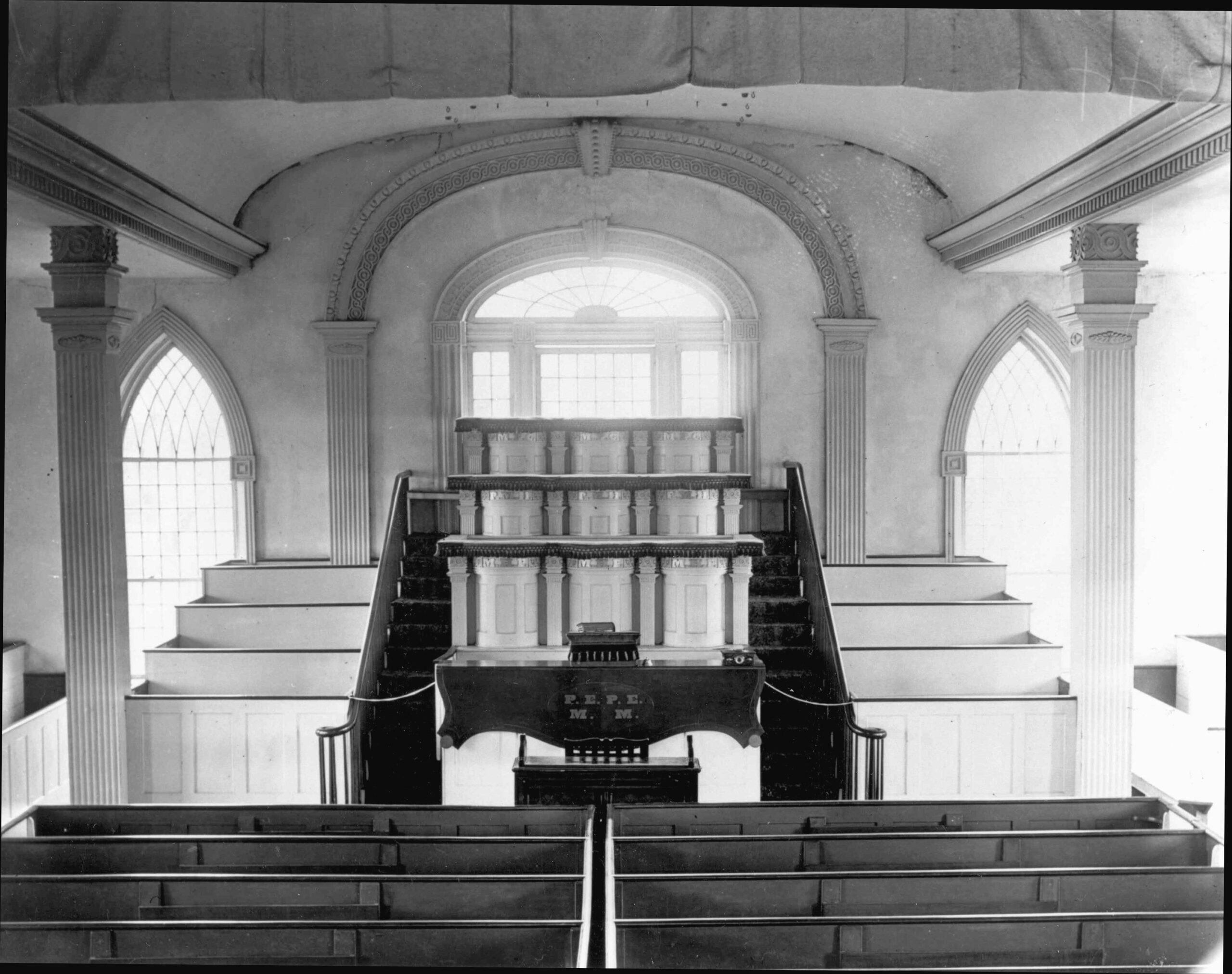
M.P.C. Melchizedek Presiding Council (First Presidency of the Church or Stake)
P.M.H. Presiding Melchizedek High Priesthood (Quorum of the Twelve Apostles, or Stake High Council)
M.H.P. Melchizedek High Priesthood (High Priests Quorum)
P.E.M. Presiding (Presidency) Elders Melchizedek (representing Elders Quorum)
EAST TIER, AARONIC PRIESTHOOD PULPITS
B.P.A. Bishop Presiding over Aaronic Priesthood
P.A.P. Presiding (Presidency) Aaronic Priests
P.T.A. Presiding (Presidency) Teachers, Aaronic
P.D.A. Presiding (Presidency) Deacons, Aaronic
Here is an interesting description of the two sets of pulpits from the autobiography of Heber C. Kimball–
In each of these rooms were built two pulpits, one in each end. Each pulpit consisted of four different apartments; the fourth standing on a platform raised a suitable height above the floor; the third stood directly behind and elevated a little above the fourth; the second in rear of and elevated above the third; and in like manner the first above the second. Each of these apartments was just large enough and rightly calculated to seat three persons, and the breastwork in front of each of these three last mentioned was constituted of three semi-circles joining each other, and finished in good style. The fourth or lower one, was straight in front, and had an elegant table leaf attached to it, that could be raised at pleasure for the convenience of administering the sacrament, etc. These pulpits were alike in each end of the house. One was for the use of the Melchizedek or High Priesthood, and the other for the Aaronic or lesser Priesthood. The first or highest apartment was occupied by the First Presidency over the whole Church; the second apartment by the Melchizedek High Priesthood; the third by the President of the High Priests’ Quorum; and the fourth by the President of the Elders and his two counselors. The highest apartment of the other pulpit was occupied by the Bishop of the Church and his two counselors; the next by the President of the Priests and his two counselors; the third by the President of the Teachers and his two counselors; and the fourth by the President of the Deacons and his two counselors. (Heber Kimball Autobiography, Journal excerpts, p.88 – p.89)
Three Orders of Priesthood
Joseph Smith August 27, 1843
The following are the various accounts of this very important sermon given by the Prophet Joseph Smith.
History of the Church, (5:554-556) Version
Respecting the Melchizedek Priesthood, the sectarians never professed to have it; consequently they never could save any one, and would all be damned together. There was an Episcopal priest who said he had the priesthood of Aaron, but had not the priesthood of Melchizedek and I bear testimony that I never have found the man who claimed the Priesthood of Melchizedek. The power of the Melchizedek priesthood is to have the power of “endless lives;” for the everlasting covenant cannot be broken. The law was given under Aaron for the purpose of pouring out judgments and destructions.
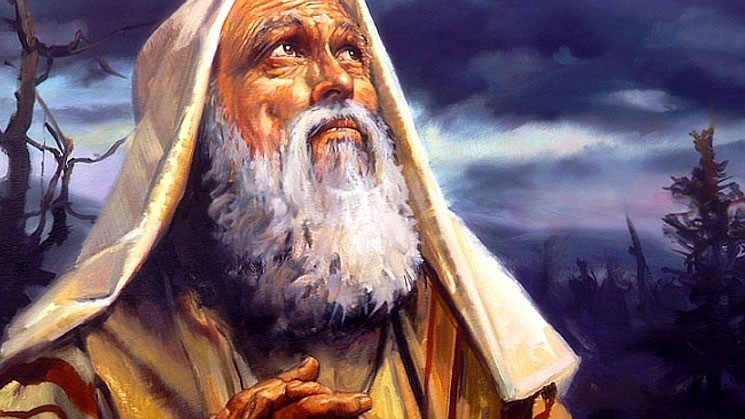
There are three grand orders of priesthood referred to here.
1st. The King of Shiloam.
(Salem) had power and authority over that of Abraham, holding the key and the power of endless life. Angels desire to look into it, but they have set up too many stakes. God cursed the children of Israel because they would not receive the last law from Moses.
The sacrifice required of Abraham in the offering up of Isaac, shows that if a man would attain to the keys of the kingdom of an endless life; he must sacrifice all things. When God offers a blessing or knowledge to a man, and he refuses to receive it, he will be damned. The Israelites prayed that God would speak to Moses and not to them; in consequence of which he cursed them with a carnal law.
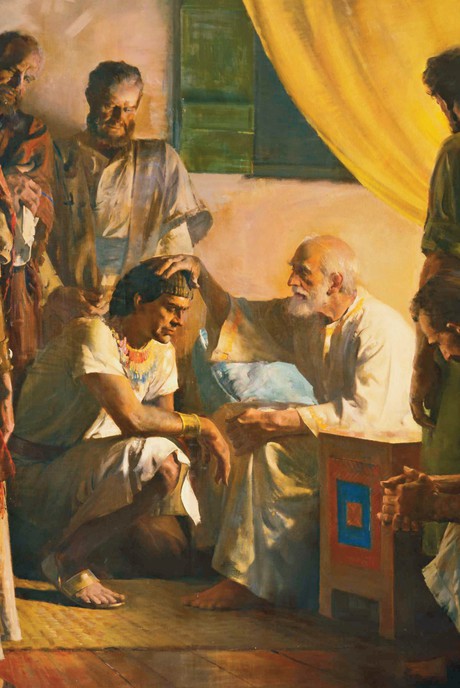
What was the power of Melchizedek? ‘Twas not the Priesthood of Aaron which administers in outward ordinances, and the offering of sacrifices. Those holding the fullness of the Melchizedek Priesthood are kings and priests of the Most High God, holding the keys of power and blessings. In fact, that priesthood is a perfect law of theocracy, and stands as God to give laws to the people, administering endless lives to the sons and daughters of Adam.
Abraham says to Melchizedek, I believe all that thou hast taught me concerning the priesthood and the coming of the Son of Man; so Melchizedek ordained Abraham and sent him away. Abraham rejoiced, saying, Now I have a priesthood. Salvation could not come to the world without the mediation of Jesus Christ.

How shall God come to the rescue of this generation? He will send Elijah the prophet. The law revealed to Moses in Horeb never was revealed to the children of Israel as a nation. Elijah shall reveal the covenants to seal the hearts of the fathers to the children, and the children to the fathers. The anointing and sealing is to be called, elected and made sure.
“Without father, without mother, without descent, having neither beginning of days nor end of life, but made like unto the Son of God, abideth a priest continually.” The Melchizedek Priesthood holds the right from the eternal God, and not by descent from father and mother; and that priesthood is as eternal as God Himself, having neither beginning of days nor end of life.
The 2nd Priesthood is Patriarchal authority. Go to and finish the temple, and God will fill it with power, and you will then receive more knowledge concerning this priesthood.
The 3rd is what is called the Levitical Priesthood, consisting of priests to administer in outward ordinance, made without an oath; but the Priesthood of Melchizedek is by an oath and covenant.
The Holy Ghost is God’s messenger to administer in all those priesthoods. Jesus Christ is the heir of this Kingdom–the only begotten of the Father according to the flesh, and holds the keys over all this world.
Men have to suffer that they may come upon Mount Zion and be exalted above the heavens. I know a man that has been caught up to the third heavens, and can say, with Paul, that we have seen and heard things that are not lawful to utter.
Franklin D. Richards’ Version
(Words of the Prophet Joseph Smith, p. 245; spelling is original)
A sermon of Josephs Heb 7 chap Salem is Shiloam
Those who limit the designs of God as concerted by the grand council of H cannot obtain the Knowledge of God & I do not know but I may say they will drink in the Damnation of their souls–
I Prophecy that all the powers of Earth & Hell shall never be able to overthrow this Boy for I have obtained it by promise–
There are 3 grand principles or orders of Priesthood 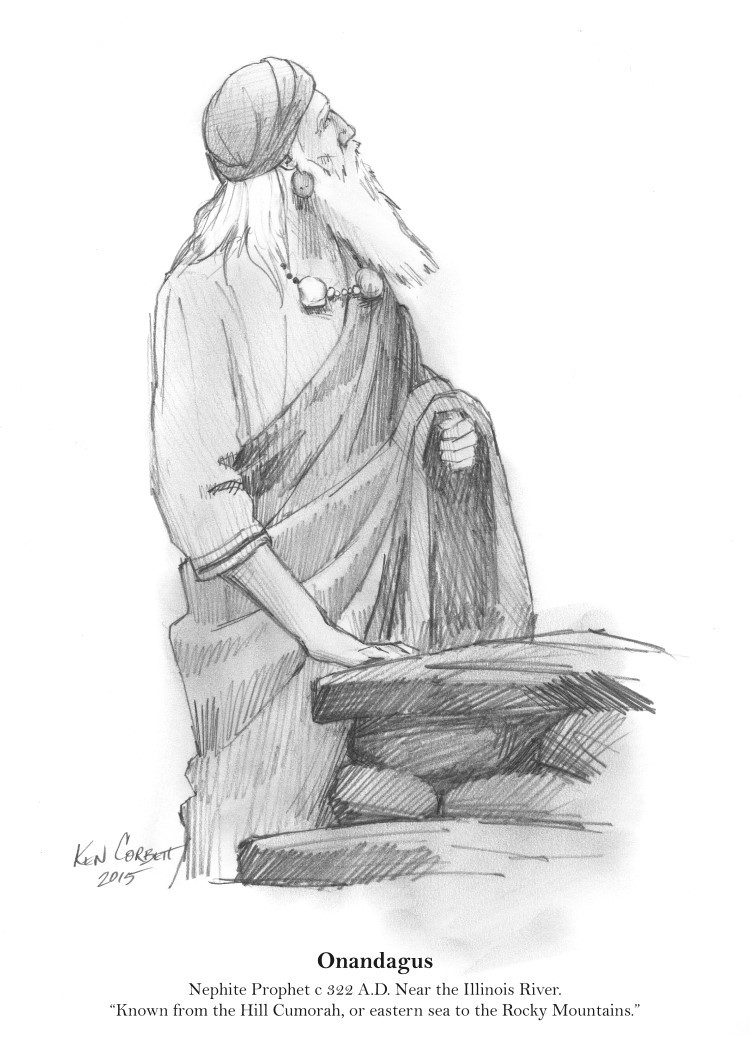
 1st Levitical which was never able to administer a Blessing but only to bind heavy burdens which neither they nor their father able to bear.
1st Levitical which was never able to administer a Blessing but only to bind heavy burdens which neither they nor their father able to bear.2 Abrahams Patriarchal power which is the greatest yet experienced in this church (21)
3d That of Melchisedec who had still greater power even power of an endless life of which was our Lord Jesus Christ which also Abraham obtained by the offering of his son Isaac which was not the power of a Prophet nor apostle nor Patriarch only but of King & Priest (22) to God to open the windows of Heaven and pour out the peace & Law of endless Life to man (23) & No man can attain to the Joint heirship (24) with Jesus Christ with out being administered to by one having the same power & Authority of Melchisedec (25) Joseph also said that the Holy Ghost (26) is now in a state of Probation which if he should perform in righteousness he may pass through the same or a similar course of things that the Son has. Source
Notes:
21. The Prophet here teaches that though Abraham had not yet received the fulness of the priesthood, he had received from the Lord the promise of an innumerable posterity both for this world and in the world to come (D&C 132:28-31). Joseph Smith, however, clarifies that Abraham’s endowment (Abraham facsimile Number 2, figures 3 and 7) was greater than that which his descendants Aaron and Levi would be allowed; and thus “Abraham’s” Patriarchal Priesthood (the ordinances of the endowment and patriarchal marriage for time and eternity) comprehended the Aaronic portion of the endowment. Additionally, the Prophet here clarifies that the Patriarchal Priesthood was not the same as the crowning ordinances of the fulness of the Melchizedek Priesthood. Elias returned the authority of promising innumerable posterity, but Elijah restored the authority of the fulness of the priesthood (D&C 110:12-16).
Aside from this theological commentary, it is important to point out that the Prophet’s teachings fit perfectly within a historical context. Joseph Smith administered the first ordinances of the Patriarchal Priesthood on 4 May 1842 when he gave both the Aaronic and Melchizedek portions of the endowment to nine men in his store in Nauvoo (see History of the Church, 5:1-2, or Teachings, p. 137; and H. W. Mills, “De Tal Palo Tal Astilla,” Annual Publications-Historical Society of Southern California 10 [Los Angeles: McBride Printing Company, 1917]: 120-21). By a year later, most of the nine received the ordinances of marriage for time and eternity. In particular, the Prophet and his wife, Emma, and James and Harriet Adams were sealed on 28 May 1843 (Joseph Smith Diary, Church Archives). Similarly, Hyrum Smith and his wife, Mary Fielding, Brigham Young and his wife, Mary Ann, and Willard Richards and his wife, Jennetta, were all sealed the next day. But the higher ordinances that confer the fulness of the priesthood had not as yet been administered. However one month and a day after this 27 August 1843 discourse, Joseph and Emma received the anointing and ordination “of the highest and holiest order of the priesthood” (Joseph Smith Diary, 28 September 1843, Church Archives). Hence by 27 August 1843, “Abrahams patriarchal power [was] the greatest yet experienced in [the] church.” As abstract as this may seem, the Prophet was not the only one who understood the relationship between these three orders of priesthood blessings that he said were illustrated in Hebrews 7; they who received these ordinances also understood these relationships. For example, Brigham Young later discussed in public discourse the relationship between the Aaronic and Patriarchal orders of the endowment as follows:
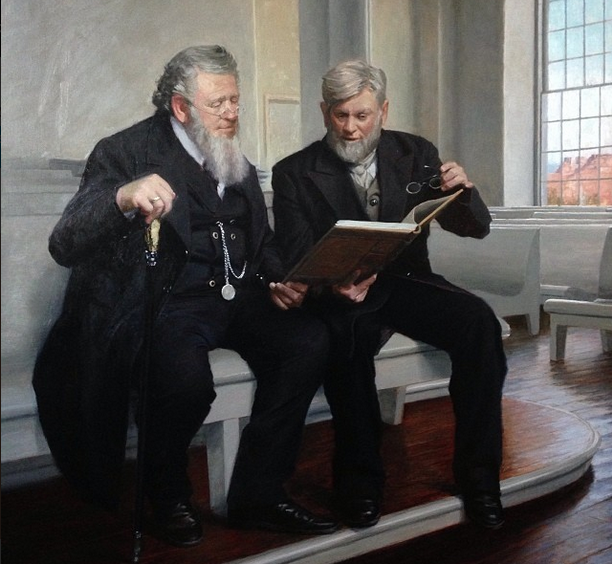
When we give the brethren their endowments, we confer upon them the Melchizedek Priesthood; but I expect to see the day, when we shall say to a company of brethren, you can go and receive the [endowment] ordinances pertaining to the Aaronic order of Priesthood, and then you can go into the world and preach the Gospel, or do something that will prove whether you will honor that Priesthood before you receive more. Now we pass them through the [temple] ordinances of both Priesthoods in one day. (Journal of Discourses, 10:309, quoted in John A. Widstoe, Discourses of Brigham Young [Salt Lake City: Deseret Book Co., 1973], p. 396).
Perhaps more important than his later understanding of the relationship between the Aaronic and Melchizedek portions of the endowment is the fact that three weeks before this 27 August 1843 discourse, Brigham Young demonstrated that the Prophet made clear to those who had received the endowment and patriarchal marriage ordinances, that they had not as yet received the fulness of the priesthood. On 6 August 1843, Brigham Young said, “If any in the church [have] the fullness of the Melchizedek Priesthood [I do] not know it. For any person to have the fullness of that priesthood, he must be a king and priest.” Since he had received, with eight others, an anointing in 1842 promising him he would, if faithful, eventually receive another anointing actually ordaining him a king and a priest, Brigham Young therefore added, “A person may be anointed king and priest long before he receives his kingdom” (History of the Church, 5:527, which is quoted verbatim from the contemporary account kept by Wilford Woodruff). Based on his understanding from Joseph the Prophet, Brigham Young said of this third order of priesthood blessings, “Those who come in here [the Nauvoo Temple] and have received their washing & anointing will [later, if faithful], be ordained Kings & Priests, and will then have received the fullness of the Priesthood, all that can be given on earth. For Brother Joseph said he had given us all that could be given to man on the earth” (Heber C. Kimball Journal, kept by William Clayton, 26 December 1845, Church Archives, italics added). This is the theological and historical context for the Prophet’s comments on the three orders of temple blessings outlined in this extremely important discourse.
22. As high and important to the Church as the offices of prophet, apostle and patriarch are, nevertheless, these highest ecclesiastical ordinations do not confer the authority of Elijah, the sealing power of the priesthood, or the power of a king and priest. As President Joseph Fielding Smith expressed it best in our own century,
I do not care what office you hold in the Church-you may be an apostle, you may be a patriarch, a high priest, or anything else-but you cannot receive the fullness of the priesthood and the fullness of eternal reward unless you receive the ordinances of the house of the Lord. Then [the door is] open so you can obtain all the blessings which any man can gain. You can have [“the fullness of the Lord’s blessings”] sealed upon you as an elder, if you are faithful; and when you receive them, and live faithfully and keep these covenants, you then have all that any man can get. There is no exaltation in the kingdom of God without the fullness of the priesthood” (Joseph Fielding Smith, first address to the Priesthood as President of the Church, 4 April 1970, The Improvement Era 73 [June 1970]: 65-66).
Regarding Abraham’s receiving the “power of an endless life” after he offered his son Isaac, see note 29, this discourse.
23. Regarding the power “to open the windows of Heaven” (Malachi 3:10), see 5 October 1840, note 19, 32.
24. Romans 8:17 (14-17).
25. See note 38, this discourse.
26. George Laub’s report of the 16 June 1844 discourse includes the following similar statement: “But the Holy Ghost is yet a Spiritual body and waiting to take to himself a body, as the Savior did or as God did, or the gods before them took bodies.” Franklin D. Richards’s account is less vague and represents the clearest statement on the personal identity of the Holy Ghost.
38. This is the only known record of when, according to Joseph Smith, the Savior received the fulness of the priesthood. Wilford Woodruff’s report of the Prophet’s 11 June 1843 discourse recorded a significant comment by Joseph Smith regarding this subject: “If a man gets the fulness of God [“priesthood” as in the published version], he has to get [it] in the same way that Jesus Christ obtained it, by keeping all the ordinances of the house of the Lord” (see 11 June 1843, note 9). To Joseph Smith, however, it was not the Lord’s will that all have Elijah confer upon them the sealing power of the fulness of the priesthood, for as Franklin D. Richards expressed it, we receive the fulness by “being administered to by one having the same power and Authority of Melchizedek” (D&C 132:7). Joseph Smith distinguished between the ordination of the twelve disciples as apostles (in Matthew 10) and the bestowal of the sealing power of Elijah upon three of the twelve (in Matthew 17), for he himself received the authority of the apostleship in 1829 (Joseph Smith-History, 1:72; D&C 27:12), but did not receive the sealing power of the fulness of the priesthood until 3 April 1836 (D&C 110:13-16; also text at notes 13-20 & of the 10 March 1844 discourse). Source

James Burgess’ Version
(The Words of Joseph Smith, pp. 245-246; spelling is original)
Hebrewes 7 chap. Paul is here treating of three different preisthoods, namely the preisthood of Aron, Abraham, and Melchizedeck, Abraham’s preisthood was of greater power than Levi’s and Melchizedeck’s was of greater power than that of Abraham. The preisthood of Levi consisted of cursings and blessings carnal commandments and not of blessings and if the preisthood of this generation has no more power than that of Levi or Aron or of a bishhoprick it administers no blessings but cursings for it was an eye for an eye and a tooth for a tooth. I ask was there any sealing power attending this preisthood. Oh no that would admit a man into the presence of God. Oh no, but Abraham’s was a more exalted power or preisthood he could talk and walk with God and yet consider how great this man was when even this patriarch Abraham gave a tenth part of all his spoils and then received a blessing under the hands of Melchesideck even the last law or a fulness of the law or preisthood which constituted him a king and preist after the order of Melchesideck or an endless life Now if Abraham had been like the sectarian world and would not have received any more revelation, what would have been the consequence it would have damned him. Book of Covenants. The levitical preisthood was an appendage to the Melchesideck preisthood or the whole law of God when in full face or power in all its parts and bearings on the earth. It is understood by many by reading this chapter that Melchesedeck was king of some country or nation on the earth, but it was not so, In the original it reads king of Shaloam which signifies king of peace or righteousness and not of any country or nation.
Malachi says that the sons of Levi shall in the last days offer an offering in righteousness.
Men will set up stakes and say thus far will we go and no farther, did Abraham when called upon to offer his son, did the Saviour, no, view him fulfiling all rightousness again on the banks of jordon, also on the Mount transfigured before Peter and John there receiving the fulness of preisthood or the law of God, setting up no stake but coming right up to the mark in all things here him after he returned from the Mount, did ever language of such magnitude fall from the lips of any man, hearken him. All power is given is given unto me both in heaven and the earth. Offering’s sacrifice’s and carnal commandments, was added in consequence of transgression and they that did them should live by them. View him the Son of God at saying it behoveth me to fulfil all rightousness also in a garden saying if it be possible let this cup pass from me nevertheless thy will be done. What was the design of the Almighty in making man, it was to exalt him to be as God, the scripture says yet are Gods and it cannot be broken, heirs of God and joint heirs I with Jesus Christ equal with him possesing all power &c. The mystery power and glory of the preisthood is so great and glorious that the angels desired to understand it and cannot: why, because of the tradition of them and their fathers in setting up stakes and not coming up to the mark in their probationary state.


